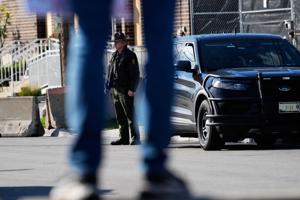Politics
Judge Extends Block on National Guard Deployment in Chicago

A U.S. District Court judge has indefinitely extended a block on the deployment of the National Guard in Chicago, as President Donald Trump faces ongoing legal challenges to his plans for military presence in Democratic-led cities. This decision comes as the U.S. Supreme Court deliberates on whether to allow the administration’s actions to proceed, highlighting the contentious relationship between federal and local authorities.
The judge’s ruling was issued following objections from local mayors and governors who argue that the military’s presence undermines their authority and poses risks to public safety. Legal experts note that this case is part of a broader trend where federal actions in urban areas are met with significant judicial pushback.
The National Guard deployment was initially proposed by the Trump administration as a response to civil unrest in various cities. However, the decision sparked immediate backlash, with city leaders asserting that such measures were unnecessary and could exacerbate tensions.
As the situation develops, the Supreme Court’s eventual ruling will be crucial in determining the future of military involvement in civilian matters. Legal analysts suggest that the Court’s decision could set a significant precedent regarding the balance of power between state and federal governments.
In the meantime, Chicago remains a focal point of this legal battle. The indefinite extension of the block means that local authorities will continue to have control over law enforcement and public safety measures without the involvement of federal troops. The judge’s ruling reflects an acknowledgment of the concerns raised by local officials regarding the potential implications of military presence in urban settings.
The legal landscape surrounding this issue is complex, with multiple court challenges and varying rulings from district courts across the country. Observers are closely watching how these developments unfold, particularly in light of the upcoming Supreme Court deliberations.
As this situation evolves, local leaders are expected to continue advocating for their autonomy in managing public safety, while the Trump administration seeks to assert federal authority in the face of unrest. The outcome of this legal struggle will likely resonate far beyond Chicago, influencing how similar cases are handled in other cities across the United States.
In summary, the indefinite extension of the block on the National Guard in Chicago underscores a significant legal impasse between federal and local authorities. With the Supreme Court’s ruling pending, the future of military involvement in civilian governance remains uncertain.
-

 Science2 months ago
Science2 months agoInventor Achieves Breakthrough with 2 Billion FPS Laser Video
-

 Health2 months ago
Health2 months agoCommunity Unites for 7th Annual Into the Light Walk for Mental Health
-

 Top Stories2 months ago
Top Stories2 months agoCharlie Sheen’s New Romance: ‘Glowing’ with Younger Partner
-

 Entertainment2 months ago
Entertainment2 months agoDua Lipa Aces GCSE Spanish, Sparks Super Bowl Buzz with Fans
-

 Health2 months ago
Health2 months agoCurium Group, PeptiDream, and PDRadiopharma Launch Key Cancer Trial
-

 Top Stories2 months ago
Top Stories2 months agoFormer Mozilla CMO Launches AI-Driven Cannabis Cocktail Brand Fast
-

 Entertainment2 months ago
Entertainment2 months agoMother Fights to Reunite with Children After Kidnapping in New Drama
-

 World2 months ago
World2 months agoIsrael Reopens Rafah Crossing After Hostage Remains Returned
-

 World2 months ago
World2 months agoR&B Icon D’Angelo Dies at 51, Leaving Lasting Legacy
-

 Business2 months ago
Business2 months agoTyler Technologies Set to Reveal Q3 Earnings on October 22
-

 Health2 months ago
Health2 months agoNorth Carolina’s Biotech Boom: Billions in New Investments
-

 Health2 months ago
Health2 months agoYouTube Launches New Mental Health Tools for Teen Users








